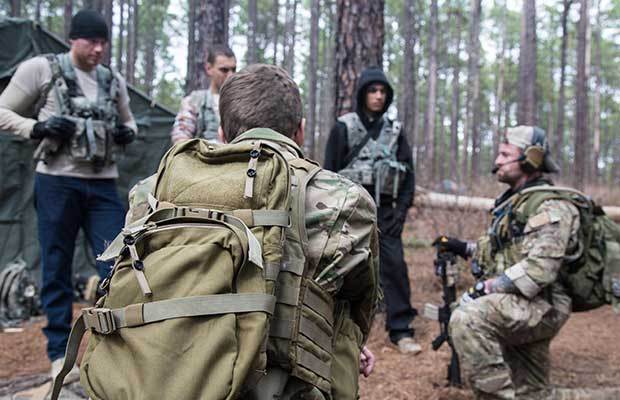Thinking of Starting a Prepper Network? Think Again!
Okay, so you don’t want to be the “lone wolf” prepper on your block. You’ve experienced the “strength in numbers” approach working on teams at work or school, and believe making friends, forming alliances before a catastrophic event is preferred. Maybe you’ve read a few of the survivor novels or have seen the movies/series where a prepper group convoys to their bug out destination. The fictional group’s platoon size, weapons with endless ammo, and burning need to escape Anytown USA for the bug out promised land, carry them through the perilous journey and daily human attrition. These stories make for great TV drama, but we can only gain a few practical tips from some of the scenarios presented as we consider the benefits of realistically starting a prepper network.
Could the lack of a connection with a local prepper network be the missing piece to your family’s survival strategy in a regional or global disaster? Do you feel the need to connect with folks in your building, on your block, in your subdivision or in the same township for mutual support? Should your planning even go further, starting an independent civilian militia?
So you’re thinking “Plug into the prepper network here in Anytown or start a small group with like-minded folks.” You believe that the network is all upside… strength in numbers, combined resources, and sharing the security work….in short, more eyes, ears and hands to share the burden. Plugging into the network could significantly increase your family’s survive and thrive capability.
What could go wrong with starting a prepper network?
Think Again! I used to think like this until our town experienced a tornado. My family, neighbors and fellow citizens taught me some key lessons and drastically changed my perspective on starting a prepper network . I’m not naive or delusional. In a long-term SHTF situation, I’m certain that hungry, armed gangs will visit our half yuppie, half farm community from their city turf literally 15 minutes away. They will be seeking food, firearms, ammunition, fuel, water filtration equipment, better vehicles, cigarettes, liquor and maybe even hostages. No, I don’t plan to “play Alamo” and die in place to defend my family and property. I’ll need to be on an effective team. So, I’m really for being on a team, but for me it’s a question of when to form the team and with whom. Please consider my observations and lessons learned. Take what you can use in your prepping, but please don’t dismiss them as conceptual or fiction.
Perceptions – Prepper vs. Survivalist vs Militia Member.
The US public and news media do not differentiate between the terms Prepper, Survivalist and Militia Member. Will it help your prepping or your survival if all your neighbors perceive your some flavor of extremist? Joe Six Pack cannot describe the difference between Prepper, Survivalist and Militia Member. Mrs. Six Pack fears all of them for no reason.
In US cities, the media has succeeded. Citizens perceive gun owners as a criminal fringe. Why do they need all those guns when we have the police to protect us? The citizenry actually believe laws will keep criminals from obtaining firearms and the police will protect them.

Militia groups can be a good place to get training with a larger group.
NRA members and anyone dubbed a “gun enthusiast” are considered worse than average gun owners … extremist advocates, on the fringe of society. Who should dare to stand up to the government to retain their rights? Two of my neighbors have asked how many guns I own. I always provide the standard answer, “just a couple of 22 target pistols.” Family members are forbidden from sharing any firearms or prepper resource information to friends and neighbors. My high school age daughters have learned to tolerate their male classmates bragging about shooting and hunting, remaining silent on their training and our equipment.
Do you want your neighbor’s perceiving you’re a Prepper, Survivalist or Militia Member? Will they treat you, your wife, or your children differently? How is their knowledge of your activities and resources to your advantage?
God, Walmart, and the Nanny State will Not Care for You.
If you’re reading this, you’re probably a prepper open to ideas and improvements, or at least a future prepper with some level of self-actualization. You embrace the unknown or ambiguity, adapt and overcome adversity. You have high awareness of the real world and you get things done. You are the poster child for self-reliant.
Most of our fellow citizens don’t think like us and are not self-reliant. They have bought into the “Somebody Else is Always Responsible” approach to life.
I don’t know about your neighbors, but my neighbors believe the anonymous “They” in the Nanny State (city, county, or state) will actually take care of their safety, water, electricity and natural gas needs in times of crisis. This includes immediately after a tornado erases 600 homes, severely damages 400 more, 25% of a community, including the homes and family homes of the 15 people who run your city. One neighbors wife assured me that “they will get the power restored” when the temperature was headed to 17 degrees that night. Her husband had gone to work, leaving the family, including a physically handicapped son, without power and heat. I offered a connection to my generator set, but was again assured “they will take care of it.”
Our city leaders were so swamped, they couldn’t communicate the changes in No-Go zones due to debris, curfews placed in force, or the homeowner cleanup restrictions the 2 days FEMA conducted their assessment. My neighbors believed the mayor and his crew could handle things. Part of the city’s electric grid was wiped out, but the mayor remarked, “city website, we don’t have time for that, we’re conducting news conferences.” Citizens outside the damage zone started a Facebook page to spread the messages. City leadership was overwhelmed and to be fair nothing could have prepared them for this.
Two of my neighbors referenced God taking care of their future. My BS detector went off recognizing rationalization for inaction. I immediately suggested God had empowered them to take care of themselves and not wait on our city officials. These folks had young children. I was told things were now in God’s hands and he was guiding our city and county leaders in the recovery. I reminded them that, except in extremely rare cases, God works through man, so they should get moving to obtain water, food and heat for their children, perhaps moving to relatives just outside the city.
Walmart’s & Kroger’s shelves were empty by Day 2. My neighbors somehow think it’s their corporate responsibility to continue to supply them., even when debris prevent the 25 daily tractor-trailer deliveries. Walmart got lumped in with the proverbial “they” in the Nanny State. Citizens were shocked at how fast the shelves were empty, not just limited selections, literally empty.
Some people will not be willing to work too hard no matter the situation.
Real World Responsibilities.
Before you plug into a prepper network, perhaps you might review you responsibilities in priority order.
Yourself. You are responsible for taking care of yourself (safety, hygiene, health) to avoid becoming a burden on your family.
Immediate Family. If you’re a parent or caring for an elder, you are responsible for them (safety, food, water, hygiene, health). In a SHTF environment, your family responsibility exceeds everything else, including friends, neighbors, colleagues, and fellow citizens. This extends to retrieving relatives to consolidate the family in one location and obtaining resources to sustain your family.
Neighbors & Friends. You should visit and assist neighbors, especially elderly and those with young children. You can assist, but do not deplete your family’s resources to assist. I checked on elderly that had no power, no communications (depleted cell batteries), no vehicle fuel and were heating one room with their propane kitchen oven. They declined to relocate to a relative’s home or a motel. I collected all their batteries, recharged, and returned them, violating the local curfew.
Neighborhood Group. Part of your family safety responsibility could become forming and engaging with a new neighborhood defense group. This needs to be done before security or looting becomes a problem. You should limit the resources you share with the group. You must mentally prepare to defend the neighborhood, relocate within the neighborhood, and/or relocate to consolidate with another neighborhood defense group.
Privacy and OPSEC.
Do we advertise when we earn a raise, buy a new TV, acquire a new gun, or install new carpet? Of course we don’t. So why would we disclose we have resources by joining local prepper groups or recruiting neighbors to form a block safety group? What advantage do you gain by non-family members’ awareness of your resources and plans?
What’s Yours is Mine, Really?
Sharing is Caring right? We believe it won’t happen to us. Wrong. My neighbors believe I should plan, buy, store & maintain emergency resources. They didn’t say this directly. Some joked “Why should I buy it when you have it and we can share it?” Others opined, “We’ve only needed emergency power twice in 10 years, so why should I invest in a generator set? This won’t happen to us again.” The What’s Your is Mine approach gets really dangerous when the crisis is extended and your neighbors believe it applies to food, water, firearms, ammunition and fuel.
Resources – Food, Water, Fuel, Power & Daylight.
Based on our neighbors’ communications and apparent resource levels, we recognized a greater need to remain silent regarding our resources. We turned off all exterior lighting. We perceived the need to have blackout curtains in a long-term crisis to conceal we powered up our home.
- Food – Several neighbors expressed concern the day of the tornado because they only had 1-2 days food on-hand. They were concerned with feeding their children. This planning is irresponsible for the middle class economic level my neighbors live at. We don’t understand. My family maintains a minimum of 30 days food in the pantry all year. We have five months of freeze-dried food from various suppliers in storage.
- Water – The tornado broke a water main and wiped out the water treatment facilities, both supply and waste treatment. My neighbors had no ability to filter water and local supplies of bottled water were purchased within 4 hours. The neighbors were complaining by the evening of Day 1, and trapped due to the curfew, preventing them from leaving town to search for water. Our teens whined about non-potable water until I explained it’s uses. I reminded them of our stored bottle water, approximately 40 gallons and had them retrieve some from the basement. This brought smiles when they recognized no need to boil water. We then took the time to locate our portable water filtration system. We also talked about obtaining water from our two 40 gallon water heaters and storing water in the home.
- Fuel – No local fuel stations had backup power. We had 3 days generator fuel on hand without siphoning from a garden tractor or pickup truck. Siphoning from cars and trucks is difficult with modern cars. Our cars and trucks all head ¾ tank of gas, so we didn’t feel we were at risk. I sent two family members out for more fuel about 3 hours after the event. I failed to brief them properly and arm them. They did not understand how far they needed to travel outside the community to obtain fuel and encountered long lines after trying to obtain fuel at 6 stations. Firearms weren’t needed, but there were arguments at gas stations when customers had many gas cans in their trunks. Trip elapsed time was more than 2 hours. Neighbors did not complain about fuel.
- Electricity – Our subdivision of almost 400 homes had only 5 homeowners running generator sets. I wondered if neighbors asked for shared power, could they provide the fuel to run the generator sets. In a long-term power outage, money collected would be useless unless I could obtain fuel. Most local gas stations do not have backup generators and do not have electrical connections that would allow portable generator connection without an electrician and rewiring. Finding the other 4 generators was easy because they were so loud. We’re using a much quieter Honda 3Kw generator and position it for additional sound suppression. We were able to power our home using only the 3Kw by not using the microwave, dishwasher, washer and dryer.
- Daylight – One valuable lesson learned is that temporary electrical re-wiring needs to be completed during daylight because it takes 4x longer in the dark by flashlight. We saved the temporary wiring and can now safely power up in 30 minutes or less.
Today’s Network Won’t Exist on Day 2.
Will the network you plug into pre-crisis, exist during the crisis? More than 40% of our neighbors did not remain in their undamaged homes during this short-term, post-tornado crisis for our subdivision. There were multiple reasons for residency change; 1) Moved in with Family Elsewhere, 2) Bugged out to a Vacation Home; and 3) Didn’t Make It Home from Travel, Stayed Away. What will the percentage of those who remain home be in a longer crisis requiring a common defense team? How hard is activating a prepper network when 50% of the members have relocated? Will members still have the same pre-crisis priorities when the prepper network is activated?
Leadership & Planning.
All family members did not return until 2 ½ hours after the tornado struck. One family member was redirected by police and debris, making a 10 minute ride, 2+ hours. She had to drive out-of-town, around through another community, and then back into town. Family members crossed debris fields and could have become stranded, requiring retrieval by other family members.
Without knowing the extent of the massive damage, the family waited another 1.5 hours to meet informally, prioritize tasks, and execute the hasty plan. In retrospect, we should have met immediately upon all members return and checked on elderly neighbors, deployed to obtain more fuel, setup the generator, and connect wiring during daylight.
Waiting for the family to return, friends and classmates were reporting erased and highly damaged homes in the tornado’s path. I walked into the damage area to assess damage on a family member’s residence and found no damage. We later returned on foot to retrieve a car and clothes. Police advised if we left with the car, she would not be permitted to return. We asked the restriction’s duration and were told duration was unknown.
Cell Networks.
Cell phone networks were overloaded with voice traffic. We reverted to text to communicate with each other. Many family members and friends were calling us from outside the area to check on us. They were seeing TV news coverage of the damage we couldn’t see without power or media. We texted them our status and asked them to stop calling so we could communicate with each other. We preempted some calls by texting our status before being asked and pleading for no calls.
Disaster Tourism.
Our city was inundated with disaster tourists immediately after the tornado. Cars from outside town with 3-5 occupants were everywhere, blocking and clogging traffic. Implementation of No-Go zones with police road blocks reduced this, but left us in long lines to pass the road blocks. We did not expect this and were unprepared.
Make sure you are not.
Okay, so you don’t want to be the “lone wolf” prepper on your block. You’ve experienced the “strength in numbers” approach working on teams at work or school, and believe







